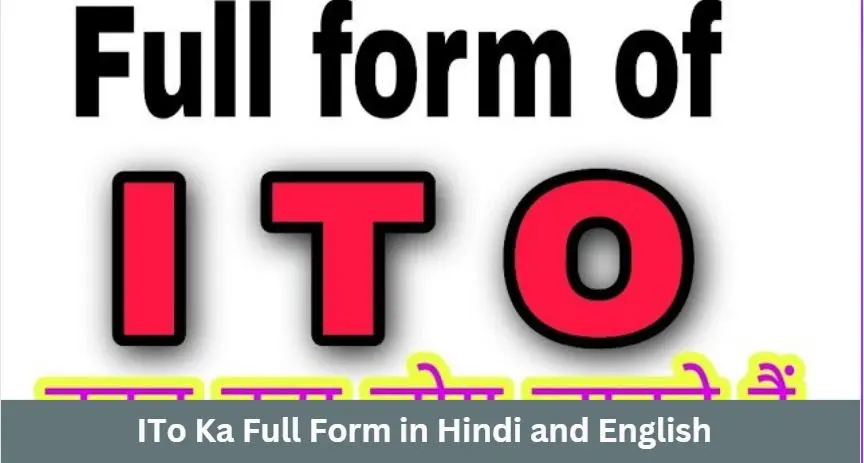ITO Full Form! Often serving as shorthand for complex concepts or organizations. Among these is “ITO,” which stands for Information Technology Outsourcing. This acronym encapsulates a crucial aspect of modern business operations, namely the delegation of information technology tasks and responsibilities to external service providers.
Information Technology Outsourcing (ITO) has emerged as a strategic practice for businesses seeking to streamline operations, reduce costs, and access specialized expertise. It involves contracting third-party vendors or service providers to manage various aspects of an organization’s IT infrastructure, software development, technical support, or other technology-related functions.
The origins of ITO can be traced back to the rapid expansion of the technology sector in the late 20th century. As businesses increasingly relied on computers, networks, and software applications to drive productivity and innovation, the demand for skilled IT professionals surged. However, many organizations found it challenging to attract and retain top talent or maintain pace with rapidly evolving technologies.
Businesses began exploring alternative models for managing their IT needs, leading to the rise of Information Technology Outsourcing. By outsourcing IT functions to specialized firms or offshore service providers, companies could access a broader pool of expertise, benefit from cost efficiencies, and focus internal resources on core business activities.
ITO encompasses a wide range of services, including infrastructure management, application development, cybersecurity, cloud computing, data analytics, and technical support. These services may be delivered through various engagement models, such as project-based outsourcing, managed services, or dedicated teams operating remotely or on-site.
What Does ITO Stand For?
ITO stands for “Information Technology Outsourcing,” which refers to the practice of hiring external IT service providers to handle various technology-related tasks and responsibilities for a business or organization. These tasks can encompass a wide range of activities such as software development, technical support, network maintenance, data management, cybersecurity, cloud computing, and other IT-related functions.
The primary objective of Information Technology Outsourcing is to enable companies to focus on their core business activities while leveraging the expertise, resources, and cost-efficiency of external IT service providers. By outsourcing IT functions, organizations can access specialized skills and knowledge without the need to invest in building and maintaining in-house IT infrastructure and talent.
ITO can be implemented through various engagement models, including project-based outsourcing, managed services, dedicated teams, offshore outsourcing, nearshore outsourcing, and onshore outsourcing. Each model offers distinct advantages and considerations based on factors such as cost, proximity, cultural compatibility, and regulatory compliance.
ITO Full Form in English
Information Technology Outsourcing (ITO) has emerged as a pivotal strategy in modern business operations, denoting the practice of enlisting external IT service providers to manage specific technology-related tasks and responsibilities. These encompass a spectrum of functions ranging from software development and technical support to network maintenance and data management.
By entrusting these critical functions to specialized vendors, businesses can refocus their resources on core activities while tapping into the expertise and cost efficiency offered by external IT providers. This strategic delegation enables companies to stay agile and competitive in an ever-evolving digital landscape without the burden of extensive in-house IT capabilities.
ITO has witnessed a surge in popularity within the global business arena, owing to its ability to grant organizations access to cutting-edge technology and skilled IT professionals without necessitating substantial internal investments. As companies strive to remain at the forefront of innovation and efficiency, Information Technology Outsourcing continues to serve as a cornerstone strategy, facilitating growth and adaptation in an increasingly interconnected world.
ITO Full Form in Hindi
आयकर पदाधिकारी (ITO) का पूरा रूप है “आयकर पदाधिकारी”। यह एक महत्वपूर्ण पद है भारतीय आयकर विभाग में। आयकर पदाधिकारी आयकर विभाग के तहत कार्य करता है और आयकर कानूनों और नियमों का पालन करता है। इसके अलावा, यह आम लोगों के आयकर दायित्वों का निर्धारण और आयकर संकलन भी करता है।
ITO भौगोलिक रूप से आयकर विभाग की उपस्थिति स्थलों पर स्थानांतरित होता है, जिससे वह अपने क्षेत्र में आयकर कानूनों का प्रभावी निर्माण कर सके। इस पद के पास अधिकार होते हैं जो आयकर विभाग के संबंधित कार्यों को संचालित करने में सहायक होते हैं और विभाग की कार्यक्षमता को बढ़ावा देते हैं।
Frequently Asked Questions
What does ITO stand for?
ITO stands for Information Technology Outsourcing.
What is Information Technology Outsourcing (ITO)?
Information Technology Outsourcing refers to the practice of hiring external IT service providers to handle certain technology-related tasks and responsibilities for a business or organization.
What types of tasks are typically outsourced through ITO?
Tasks commonly outsourced through ITO include software development, technical support, network maintenance, data management, cybersecurity, cloud computing, and other IT-related functions.
Why do companies engage in Information Technology Outsourcing?
Companies engage in ITO to focus on their core activities, reduce costs, access specialized expertise, stay agile, and remain competitive in the digital landscape without investing in extensive in-house IT capabilities.
What are the benefits of Information Technology Outsourcing?
Some benefits of ITO include cost savings, access to specialized skills and expertise, scalability, flexibility, improved efficiency, and the ability to adapt to technological advancements quickly.
What are the different engagement models used in Information Technology Outsourcing?
Common engagement models in ITO include project-based outsourcing, managed services, dedicated teams, offshore outsourcing, nearshore outsourcing, and onshore outsourcing.
Conclusion
Information Technology Outsourcing (ITO) represents a strategic approach adopted by businesses worldwide to effectively manage their technology-related tasks and responsibilities. Through ITO, companies can leverage the expertise and resources of external IT service providers to streamline operations, reduce costs, access specialized skills, and remain competitive in today’s digital landscape.
The benefits of ITO are manifold, including enhanced efficiency, scalability, flexibility, and improved focus on core business activities. By outsourcing IT functions, organizations can adapt to technological advancements swiftly, accelerate innovation, and drive growth while mitigating the need for extensive in-house IT infrastructure.
